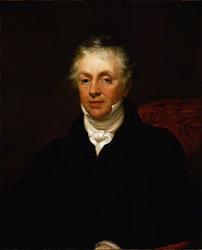1764 - 1844 Person Name: M. Camidge, 1758 - 1844 Composer of "[When the Lord turned again the captivity of Zion] (Camidge)" in The Hymnary for use in Baptist churches Matthew Camidge (25 May 1758 - 23 Oct 1844 in York) was a well-known local musician in Northern England, famous for his organ playing and conducting oratorios. His compositions are solid in craftsmanship though quite conservative. He was the son of John Camdige,who was also an organist and composer and Elizabeth Camidge.
After some time as a chorister of the Chapel Royal under James Nares, Matthew returned to York where he lived the rest of his life. He served as his father's assistant and in 1799 he succeeded his father as organist of York Minster. He played an active part in the musical life of York, appearing as a soloist in piano and organ concertos and promoting music festivals in York Minster. After Matthew retired in 1842, his son, John Camidge, succeeded him as organist.
Matthew Camidge was known for his brilliant organ improvisations. He organized huge music festivals given at York in 1823, 1825, and later. As a violinist, he led the orchestra of the York Musical Society. He contributed 30 excellent hymn tunes for William Richardson's Collection of Psalms, which in later editions became widely known as The York Psalm and Hymn Book. It is likely that Camidge introduced the practice of psalm chanting to St Michael-le-Belfrey, his other church job, which he obtained in 1801.
Matthew Camidge published works of practical material written for his work as a church musician and teacher as well as anthems and service settings in Cathedral Music, Hymn and psalm tunes, an edition of Henry Lawes' Psalmody for a single voice, Instructions for the Piano forte or Harpsichord and some songs.
From Camidge family wiki (https://en.m.wikipedia.org/wiki/Camidge_family), Creative Commons License
Matthew Camidge


 My Starred Hymns
My Starred Hymns






